Knitted chainmail, fishing rod bats, and handmade sets - the story of Horncastle Theatre Company
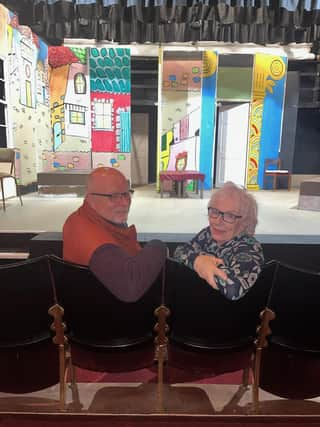

It all began when a small advert was placed in the Horncastle News on February 1, 1973, appealing for anyone who was interested in amateur dramatics to come along to a meeting the following week at the Stable Bar at the Rodney Hotel, now the Admiral Rodney, in Horncastle.
Six people attended the initial meeting that day with the aim of reviving a drama society in town, and within weeks, Horncastle Theatre Company was born with enough people joining to start planning their first production – ‘Passion, Poison & Petrification’, a short play by Bernard Shaw.
Advertisement
Hide AdAdvertisement
Hide AdOne of these original members was Priscilla Burbidge, who is still a member of the company to this day.
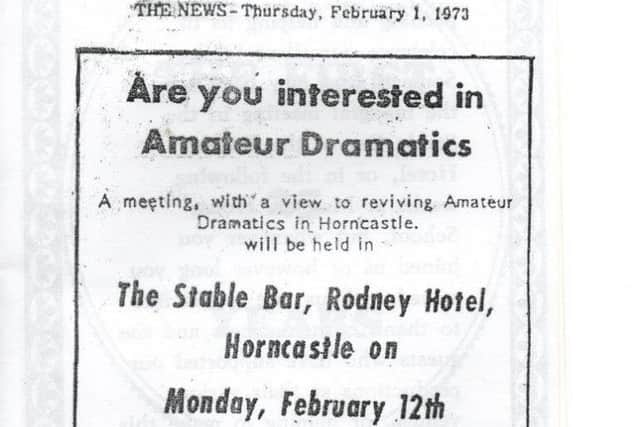

She said: “We didn’t have a theatre in those days, so we had rehearse in the upstairs Stable Bar of the Rodney, or wherever we could – we’ve been in the old church on Queen Street, the Maypole House School, and Horncastle Youth Centre.”
As luck would have it, another of the group’s founder members, David Ireland, was headteacher of Tetford school [now Edward Richardson primary school], and he recalled the early days of rehearsing in this “cosy" upstairs room:
"We were always welcome and often stayed late in the bar after rehearsal,” he said, “On more than one occasion when trouble, or the police were looming, we were locked in the small snug bar – crowded in with the stuffed foxes and pheasants!”
Advertisement
Hide AdAdvertisement
Hide AdDavid let the players use the school hall for their plays: "I remember the early days when David Clench, the art teacher at the school, who was such a talented artist, would use all the leftover paint to paint the sets,” he remembered, “And we would keep the flats we used to make the sets in the old bus station building at the grammar school.”
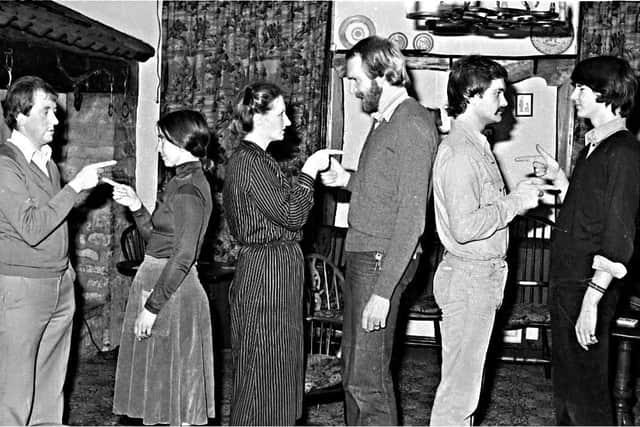

"These were the days where we had absolutely nothing,” Priscilla added, “We’d use whatever we could on costumes, sets, special effects – everything.”
David recalled one memorable production of Dracula in 1982 where bats were flown over the audience using fishing rods reeled in quickly by two young boys at the back of the auditorium.
"Then we used knitted chainmail in The Thwarting of Baron Bollygrew in 1977, and shook sheets of aluminium to make the sound of thunder,” Priscilla added.
Advertisement
Hide AdAdvertisement
Hide AdThe group became an official theatre company in 1983, and soon after, the company began to rehearse in the upstairs area at the Red Lion pub in town – which is now used as the cast’s dressing room – and turned their thoughts to finding a permanent home to host their plays and pantomimes.
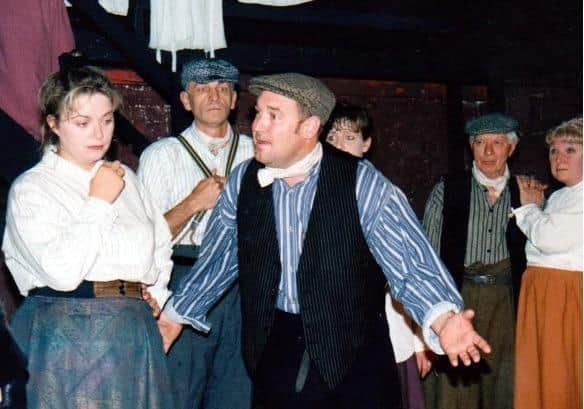

They were offered the chance to buy the Trinity Church, but the position of the pillars inside the building meant that the line of sight to the stage would be blocked from many angles, and a similar problem arose with the old church on Queen Street.
Then the idea of a custom-made theatre using a number of buildings at the back of the Red Lion became a possibility, and then-chairman Ann Wayne and her husband Bob began the quest to make it happen, each taking on the fundraising and design and structural work respectively.
"We were very lucky as people were so generous,” Priscilla remembered, “The pub at Scamblesby was having its roof replaced and they gave us some of their old pan tiles, and an old bingo hall in Bradford gave us our seats – which we still have to this day as they’re so comfortable, although they’ve been recovered a few times.”
Advertisement
Hide AdAdvertisement
Hide AdThe Lion Theatre was officially opened on December 10, 1988, with legendary TV actress and fellow Lincolnshire lass Patricia Hodge OBE becoming honourary president and officially opening the theatre, and in 2018, the company celebrated the 30th anniversary of the new building.
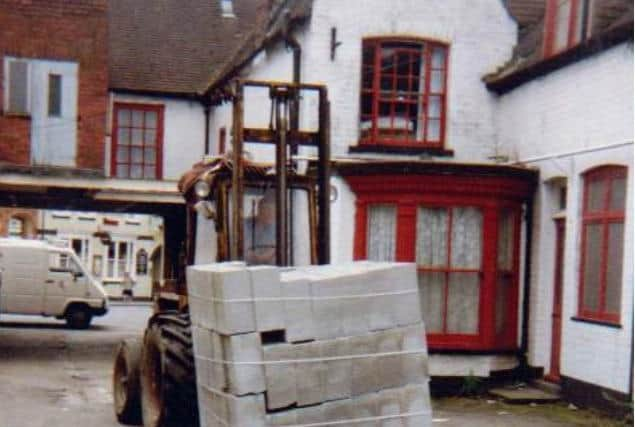

Alice in Wonderland became the first production performed at the theatre that same year, and since then, the theatre has gone from strength to strength – at its most busy, performing up to eight shows a year with a turn-around time of just six weeks.
David said: “We’re really lucky, we have a really good relationship with the Red Lion, without that we wouldn’t be here.”
The group also boasts an impressive two active youth groups Young and Up Stagers, with a number of members going on to become professional West End performers in shows including The Tina Turner Story, Kinky Boots, and War Horse.
Advertisement
Hide AdAdvertisement
Hide AdJust a few highlights for the theatre company has included attending NODA festivals, where they have won a number of awards over the years, as well as attending the prestigious annual play festival hosted by Skegness Playgoers at the Embassy Theatre.
Horncastle Theatre Company won the festival outright twice, including one memorable performance of Brassed Off in collaboration with Horncastle’s Banovallum Brass band, and the other with Accrington Pals.
Both plays went on tour to the National All Winners’ Festival in Woking.
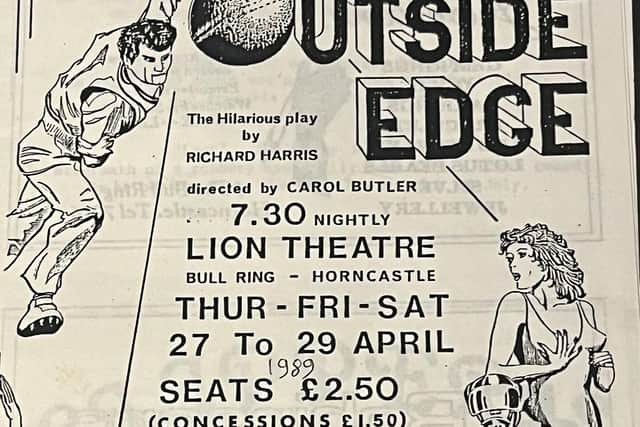

"You just meet the most interesting people from all walks of life in the theatre,” Priscilla said, “I can’t imagine what I would have done if I had never joined.”
Advertisement
Hide AdAdvertisement
Hide AdCurrently heading up the company is chairman Dominic Hinkins, for whom the theatre is a family affair as mum Gail and dad Chris – who actually met through the theatre company – are also long-standing members, the latter serving as the company's music master.
Dominic said: “It is an incredible milestone – the theatre has been around a lot longer than I have, and it continues to go from strength to strength, so I fully expect it to still be here when I’m gone.
"My personal mission is to ensure that future generations in Horncastle have access to good, live theatre in the heart of the community, and a place to participate in the performing arts.
Dominic said the secret to the theatre’s success is due to four things – passion and dedication of the individuals involved, never losing sight of the fact this is a hobby, not a job, being one big, inclusive family, and democratic ethos:
Advertisement
Hide AdAdvertisement
Hide Ad”Some people seem to live in the theatre and we couldn’t do it without them,” Dominic said, “While putting on five plays a year is very hard work, it simply would not happen if we weren’t all having such a good time doing it.
"I’ve grown up among the same lovely people for 30 years, so I’ve come to think of them like aunts, uncles and siblings. Like any family, there’s sometimes a bit of drama (we’re actors, after all) but we are a deeply supportive, close-knit group and people tend to stay involved for decades.
"Unlike other companies, which can be cliquey, top-down or exclusive, our tradition is that everyone has a voice and everyone is invested in the success of the Company, not just one play.”
To find out more about Horncastle Theatre Company, visit their website at https://www.horncastletheatre.co.uk/